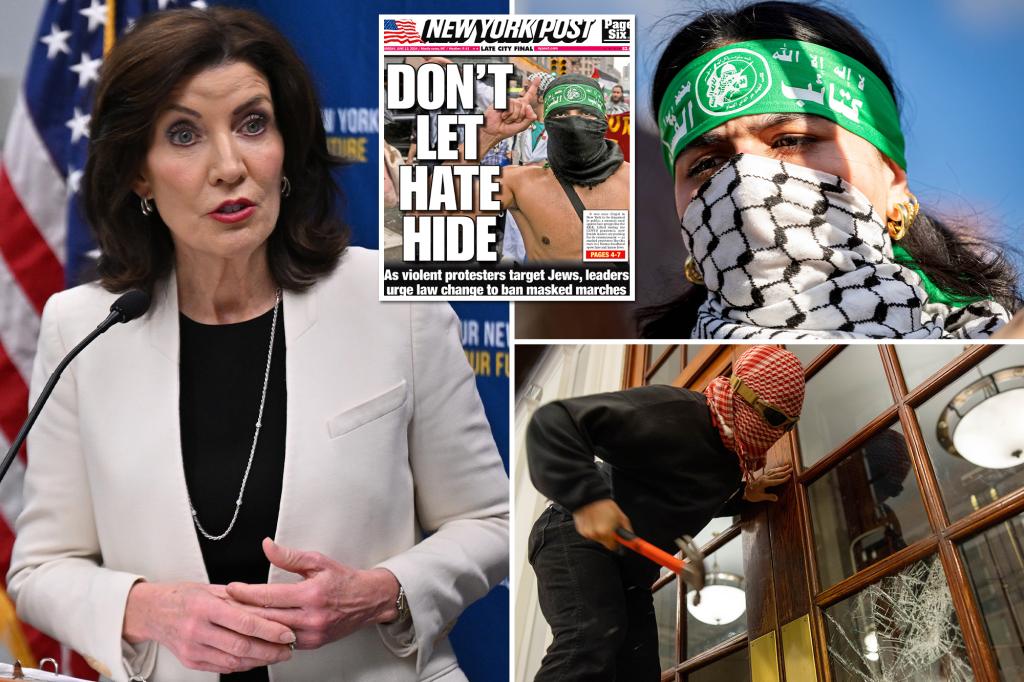Gov. Kathy Hochul is considering reinstating a New York mask ban in response to recent antisemitic incidents in New York City. She views the events, including masked protesters demanding “Zionists” to raise their hands on a subway train, as clear examples of antisemitism. Hochul is open to reconsidering the anti-masking law that was repealed during the COVID-19 pandemic, in light of the growing number of incidents. She believes that people should not have to fear for their safety or feel intimidated due to their religious beliefs in the state of New York.
Supporters of a mask ban argue that requiring protesters to show their faces will help curb violent and hateful incidents. They draw a parallel between the potential effectiveness of anti-masking laws in dealing with the Ku Klux Klan’s hooded threats in the past. Mayor Eric Adams also appears to support the idea of reinstating a mask ban, with his administration approaching various elected officials and parties to collaborate on this initiative. State Assemblyman Mike Reilly, among other legislators, welcomes the possibility of restoring the state’s mask laws and is encouraged by bipartisan support for such a measure.
Reilly’s bill proposing the reintroduction of the anti-masking law includes provisions for legal penalties for those who threaten others or cause property damage while masked. He hopes that the law will strike a balance between protecting freedom of speech and ensuring public safety. Hochul’s willingness to consider these measures is seen as a positive step towards addressing antisemitic hate incidents in the state. The need to act swiftly to prevent such hateful acts from escalating further is evident, and reinstating the mask ban may serve as a deterrent to those seeking to spread fear and intolerance.
The prospect of a mask ban being reinstated has generated support from both Democratic and Republican legislators in New York. There is a consensus among various lawmakers that addressing hate incidents should be a priority, and a mask ban could be a crucial step in achieving this goal. Reilly and other proponents of the law emphasize the need to act decisively in the face of rising antisemitism and other forms of hate. By making masked perpetrators accountable for their actions, the law could deter future incidents and create a safer environment for all residents of the state.
Hochul’s acknowledgment of the need to address antisemitism through concrete measures demonstrates her commitment to ensuring the safety and well-being of New York residents. The proposal to reinstate a mask ban is viewed as a proactive step towards combating hate crimes and protecting vulnerable communities. By taking a firm stance against antisemitic incidents and holding perpetrators accountable, Hochul and other policymakers are sending a strong message that such behavior will not be tolerated in the state. The bipartisan support for the reintroduction of a mask ban underscores the urgency and importance of addressing hate incidents promptly and effectively.
In conclusion, the consideration of reinstating a mask ban in response to antisemitic incidents in New York shows a united front among lawmakers and policymakers to address hate crimes. Hochul’s openness to revisiting the anti-masking law and the bipartisan support for such measures signal a determined effort to combat intolerance and ensure public safety. By imposing legal penalties on those who engage in hateful actions while masked, legislators seek to create a more inclusive and secure environment for all residents of the state. The proposed reinstatement of the mask ban reflects a collective commitment to upholding democratic values and protecting vulnerable communities from hate and discrimination.












